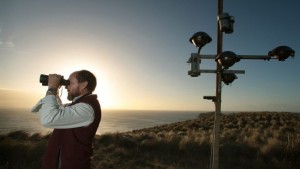 Within the next couple of weeks, a remote part of north-western Tasmania is likely to grab headlines around the world as a major climate change marker is passed.
Within the next couple of weeks, a remote part of north-western Tasmania is likely to grab headlines around the world as a major climate change marker is passed.
The aptly named Cape Grim monitoring site jointly run by CSIRO and the Bureau of Meteorology will witness the first baseline reading of 400 parts per million (ppm) of carbon dioxide in the atmosphere, researchers predict.
“Once it’s over [400 ppm], it won’t go back,” said Paul Fraser, dubbed by CSIRO as the Air Man of Cape Grim, and now a retired CSIRO fellow. “It could be within 10 days.”
The most recent reading on May 6 was 399.9 ppm, according to readings compiled by the CSIRO team led by Paul Krummel that strip out influences from land, including cities such as Melbourne to the north. (See chart below, with the red line showing the baseline CO2.)
The approaching global CO2 threshold comes as climate change looks like becoming one of the key issues in Australia’s election campaign.
The Turnbull government has made clear it will oppose Labor’s proposals for an emissions trading scheme that will again put a price on carbon pollution.
New data out on Tuesday show that emissions from the country’s main electricity grid covering the eastern states have risen 5.7 per cent – or 8.7 million tonnes – in the year to April compared with the final 12 months of the carbon tax that the Abbott government scrapped in July 2014, according to energy consultants Pitt & Sherry.
The share of coal in the National Electricity Market has risen to 76.2 per cent – its highest level since September 2012 – from 72.3 per cent during the period since June 2014, the consultants’ latest Cedex report said.
Mark Butler, Labor’s shadow environment minister, said the Cape Grim landmark reading was “deeply concerning”.
“While the Coalition fights about whether or not the science of climate change is real, pollution is rising. And it’s rising on their watch,” Mr Butler said.
Greens deputy leader Larissa Waters said the Cape Grim result “should act as a global wake-up call and must shock both Australian big political parties out of their blind coal-obsession which is literally cooking our planet and our Great Barrier Reef”.
“Our atmosphere cannot take any new coal mines – both the old parties must stop approving them and revoke their approval of the Adani coal mine [in Queensland] at both the state and federal level,” Senator Waters said. Read more CLICK HERE.




